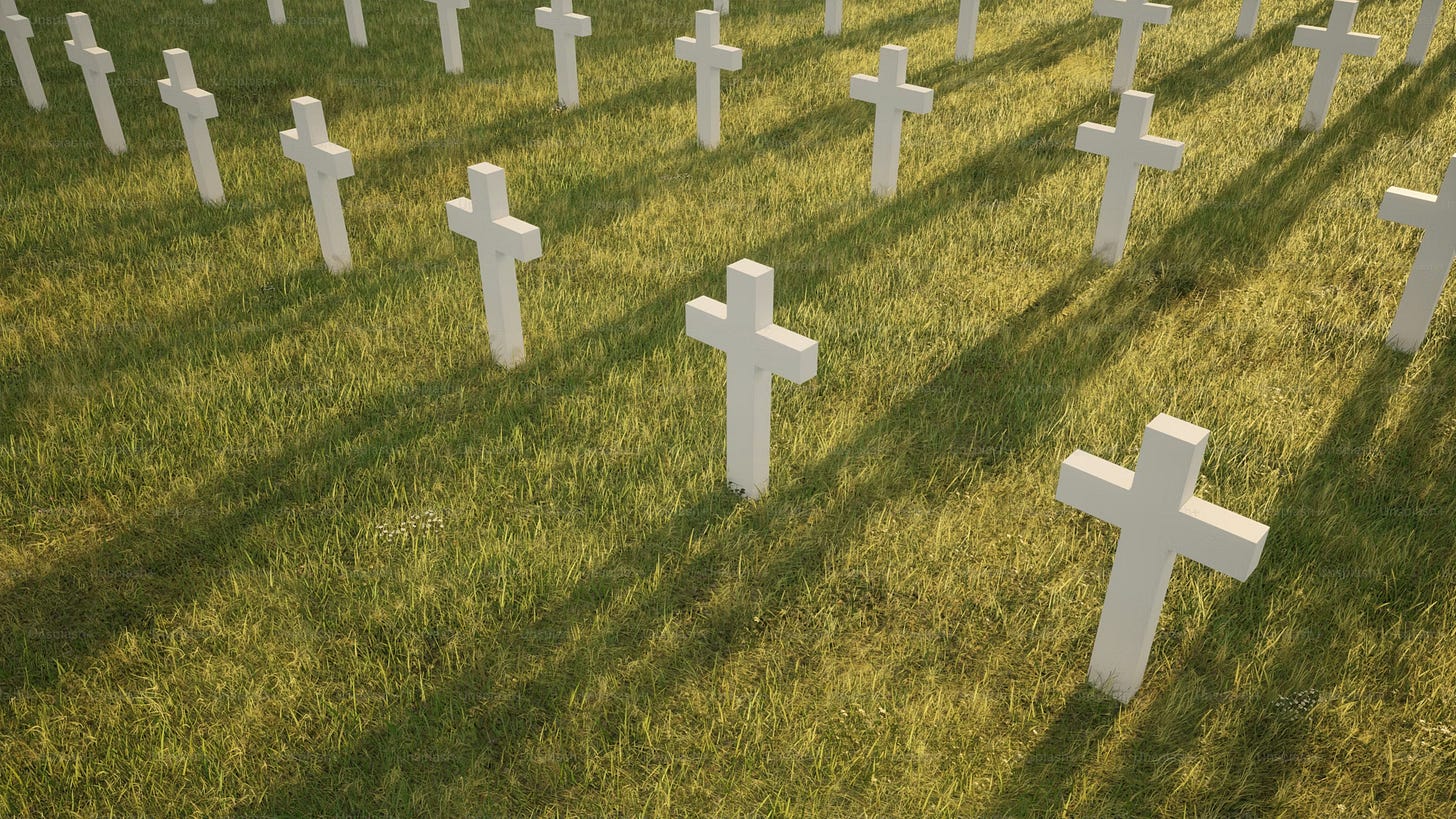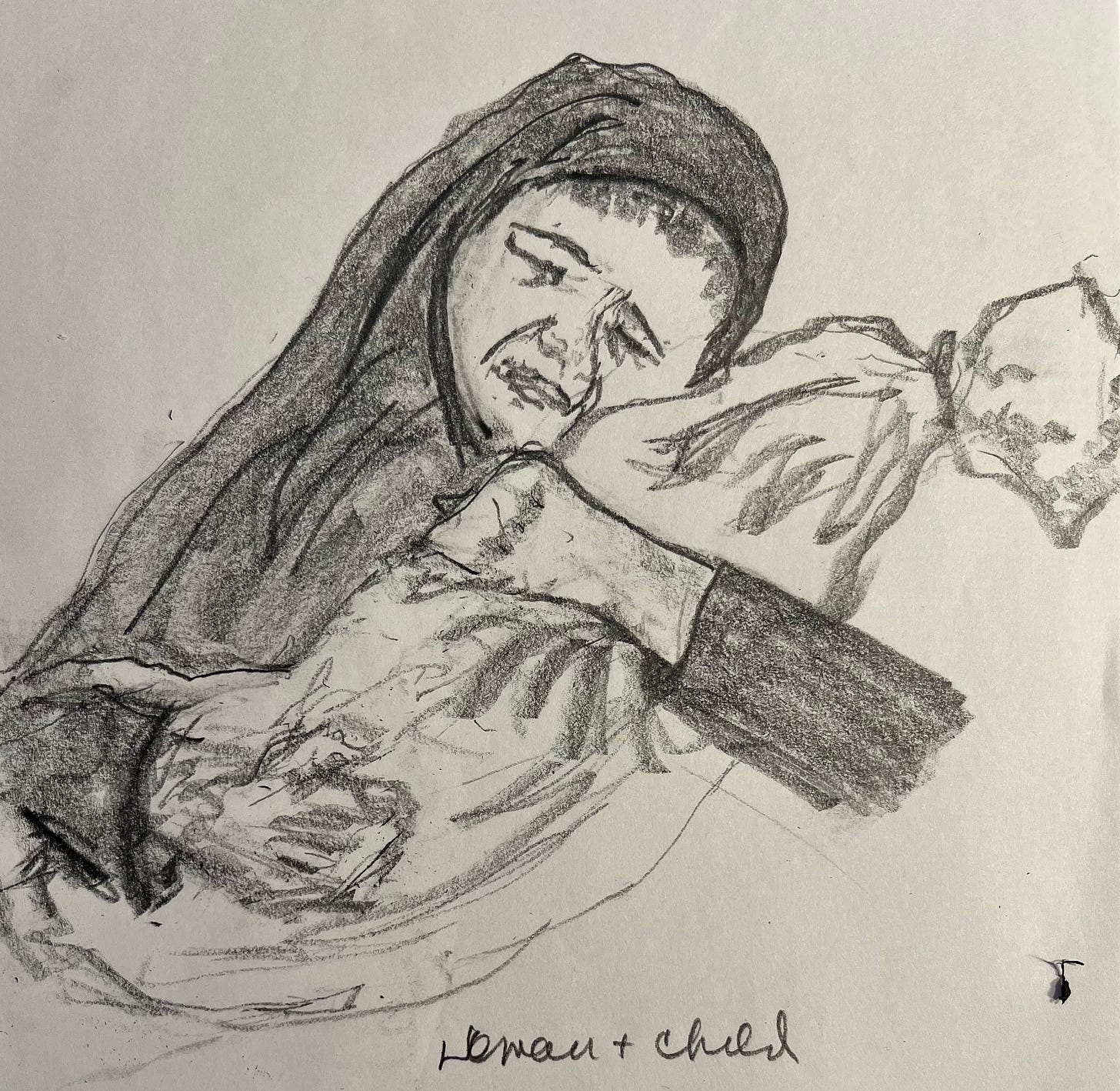Memorial Day. Flags. Parades. Peonies on gravestones.
Prayers. For the souls of those lost to war, the safety of those engaged in battle. For the country that sent them there: ours.
We don’t talk much about what war is on this day, though.
For years, the soldiers who fought in wars and the civilians caught up in them were the only ones who could really know what it was like. With Vietnam came the ability to see it on the evening news. Now we can see war pretty much 24/7—on TV, on the internet—most recently, in Gaza.
I’ve been mesmerized by the videos of explosions and their aftermaths: bodies along the roadside, children screaming, hospitals with injured people lying on the floor in their own blood and the blood of others.
Not our war, I know. Yet that war is being waged with our help. Our money. Sometimes I draw photos I see online. I have to look and keep looking to get them right. It seems a kind of witnessing.
I want to send Mark Twain’s “The War Prayer” to every person in charge of anything that has to do with war and every person who can’t or won’t see what war does to the people who get in its way.
I’m not saying all war is wrong; sometimes it is necessary.
I’m not saying I don’t respect and honor the men and women who choose to serve, especially those who sacrificed their lives and those who survived but will live and relive whatever war they fought in all their lives.
I do.
I’m just saying, when it comes time to make the decision to go to war ourselves or to support another country’s war, could we just remember what war does to those willing soldiers and to thousands of innocent people who get in its way?
I’m thinking a required read-aloud of Mark Twain’s of Mark Twain’s “The War Prayer” before the vote is taken would be an excellent idea.
It begins, “It was a time of great and exalting excitement. The country was up in arms, the war was on, in every breast burned the holy fire of patriotism…”
The church is filled on the Sunday before the battalions are set to leave for the front, the soldiers present, “their young faces alight with martial dreams.”
The pastor speaks of “the rushing charge, the flashing sabers, the flight of the foe…” Their return as heroes. He prays that “an ever-merciful and benignant Father of us all would watch over our noble young soldiers, and aid, comfort, and encourage them in their patriotic work…”
Then an ancient stranger appears, dressed in a long robe, his face ghastly pale, and makes his way to the pulpit to addresses the congregation.
“I come from the Throne—bearing a message from Almighty God!”
“God’s servant and yours has prayed his prayer,” he says. “Has he paused and taken thought? Is it one prayer? No, it is two — one uttered, the other not.”
God has commissioned him to put the second prayer—the one they prayed silently—into words:
“‘O Lord our Father, our young patriots, idols of our hearts, go forth to battle — be Thou near them! With them — in spirit — we also go forth from the sweet peace of our beloved firesides to smite the foe. O Lord our God, help us to tear their soldiers to bloody shreds with our shells; help us to cover their smiling fields with the pale forms of their patriot dead; help us to drown the thunder of the guns with the shrieks of their wounded, writhing in pain; help us to lay waste their humble homes with a hurricane of fire; help us to wring the hearts of their unoffending widows with unavailing grief; help us to turn them out roofless with little children to wander unfriended the wastes of their desolated land in rags and hunger and thirst, sports of the sun flames of summer and the icy winds of winter, broken in spirit, worn with travail, imploring Thee for the refuge of the grave and denied it — for our sakes who adore Thee, Lord, blast their hopes, blight their lives, protract their bitter pilgrimage, make heavy their steps, water their way with their tears, stain the white snow with the blood of their wounded feet! We ask it, in the spirit of love, of Him Who is the Source of Love, and Who is the ever-faithful refuge and friend of all that are sore beset and seek His aid with humble and contrite hearts. Amen.’”
Twain’s “War Prayer” concludes:
“‘Ye have prayed it; if ye still desire it, speak! The messenger of the Most High waits!’”
“It was believed afterward that the man was a lunatic, because there was no sense in what he said.”







I can only imagine it, of course. But I do think it's important for those of us whose lives have been free of it TRY to imagine, to know what war actually does. The whole glory thing makes me a little crazy.
Thank you for this! I couldn’t agree more ❤️